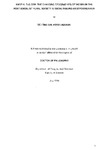Made in the GDR : the changing geographies of women in the post-socialist rural society in Mecklenburg-Westpommerania
| dc.contributor.author | Hoven-Iganski, Bettina van | |
| dc.contributor.other | School of Geography, Earth and Environmental Sciences | en_US |
| dc.date.accessioned | 2011-05-11T09:33:50Z | |
| dc.date.available | 2011-05-11T09:33:50Z | |
| dc.date.issued | 1999 | |
| dc.identifier | Not available | en_US |
| dc.identifier.uri | http://hdl.handle.net/10026.1/365 | |
| dc.description.abstract |
This thesis explores women's experiences in rural areas under state socialism in the GDR and in the New Germany since 1989. The study is located within feminist geographical thinking and draws on a variety of qualitative and quantitative sources. Data for the research were collated through various research methods both qualitative and quantitative including correspondence, focus group interviews, key informant interviews, and the consultation of documentary evidence and statistical sources. The thesis employs a modified grounded theory approach. Data were processed and analysed using the computer-assisted analysis programme NUD.IST Version 4.0. The thesis focuses on questions that emerge from a critical analysis of social transformation. A key concern is to evaluate how dominant patriarchal power structures have impacted upon women's everyday lives under socialism and capitalism. Three main themes are foci of this thesis: the changes in social dynamics in rural villages, the impact of economic rationalisations on women, and the nature and extent of women's participation in new political structures. With reference to the former GDR the research showed that many rural women found comfort in social relations they established within the village and the workplace. Such social networks became important elements for women's self-identification and helped counteract suppression through the patriarchal socialist State. German unification overthrew previous values and daily routines of many rural women through vast economic and political changes. The unfamiliarity with a new, sometimes undesirable framework of reference for everyday life and society caused many rural women to withdraw to the private sphere and question their previous identities as rural GDR citizens. Positive opportunities for women's futures have not outweighed negative experiences with transition. Instead, conflicts have prevented women's equal integration into the political and economic structures of the New Germany. Further areas of research are proposed that may add depth to insights gained from this thesis as well as offering possible areas for gender-sensitive policy development in rural Mecklenburg-Westpommerania. | en_US |
| dc.description.sponsorship | Department of Geographical Sciences at the University of Plymouth, the Dudley Stamp Memorial Fund. | en_US |
| dc.language.iso | en | en_US |
| dc.publisher | University of Plymouth | en_US |
| dc.subject | Feminism | |
| dc.subject | Geography | |
| dc.subject | Sociology | |
| dc.subject | Human services | |
| dc.subject | State socialism | |
| dc.subject | Rural areas | |
| dc.subject | Feminist geographies | en_US |
| dc.title | Made in the GDR : the changing geographies of women in the post-socialist rural society in Mecklenburg-Westpommerania | en_US |
| dc.type | Thesis | |
| dc.identifier.doi | http://dx.doi.org/10.24382/4916 | |
| dc.identifier.doi | http://dx.doi.org/10.24382/4916 |
Files in this item
This item appears in the following Collection(s)
-
01 Research Theses Main Collection
Research Theses Main


